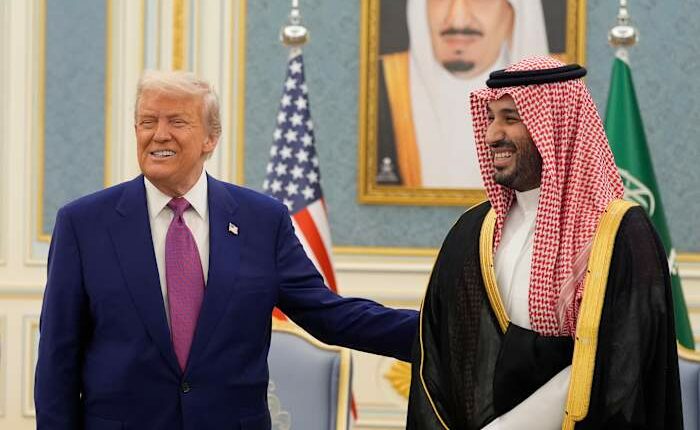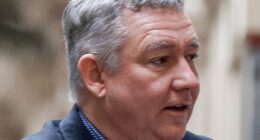Share this @internewscast.com

WASHINGTON – President Donald Trump is preparing to host Crown Prince Mohammed bin Salman in a significant visit to the White House on Tuesday. This marks the Saudi prince’s first appearance there since the controversial 2018 killing of journalist Jamal Khashoggi, an event that strained diplomatic ties between the two nations.
The murder of Khashoggi, a fierce critic of Saudi Arabia, at the hands of Saudi agents resulted in widespread condemnation and a temporary rift in U.S.-Saudi relations. U.S. intelligence agencies later suggested that Prince Mohammed likely orchestrated the operation, a claim he continues to deny despite the ongoing scrutiny.
However, as years have passed, relations have thawed, with Trump now openly embracing the 40-year-old crown prince. Trump considers him a crucial partner in shaping the future of the Middle East, while Prince Mohammed seeks to dismiss his alleged involvement in Khashoggi’s death, maintaining his innocence in the matter.
The agenda for this visit appears to focus less on the past controversies and more on future collaborations. The two leaders are expected to announce a series of lucrative deals worth billions and engage in strategic discussions about the complex dynamics of the Middle East. The day will culminate in a lavish White House event hosted by First Lady Melania Trump to honor the crown prince.
In anticipation of the visit, Trump expressed his admiration for Saudi Arabia, stating, “They have been a great ally.” This sentiment underscores the administration’s intent to strengthen ties with the kingdom, overlooking past grievances in favor of mutual economic and strategic interests, including potential deals involving fighter jets and other business ventures.
Fighter jets and business deals
Ahead of Prince Mohammed’s arrival, Trump announced he has agreed to sell the Saudis F-35 fighter jets despite some concerns within the administration that the sale could lead to China gaining access to the U.S. technology behind the advanced weapon system.
Trump’s announcement is also surprising because some in the Republican administration have been wary about upsetting Israel’s qualitative military edge over its neighbors, especially at a time when Trump is depending on Israeli support for the success of his Gaza peace plan.
But the unexpected move comes at a moment when Trump is trying to nudge the Saudis toward normalizing relations with Israel.
The president in his first term had helped forge commercial and diplomatic ties between Israel and Bahrain, Morocco and the United Arab Emirates through an effort dubbed the Abraham Accords.
Trump sees expansion of the accords as essential to his broader efforts to build stability in the Middle East after the two-year Israel-Hamas war in Gaza.
And getting Saudi Arabia — the largest Arab economy and the birthplace of Islam — to sign on would create an enormous domino effect, he argues. The president in recent weeks has even predicted that once Saudi Arabia signs on to the accords, “everybody” in the Arab world “goes in.”
But the Saudis have maintained that a clear path toward Palestinian statehood must first be established before normalizing relations with Israel can be considered. The Israelis, meanwhile, remain steadfastly opposed to the creation of a Palestinian state.
The U.N. Security Council on Monday approved a U.S. plan for Gaza that authorizes an international stabilization force to provide security in the devastated territory and envisions a possible future path to an independent Palestinian state.
Assurances on US military support
The leaders certainly will have plenty to talk about including maintaining the fragile ceasefire in Gaza, mutual concerns about Iran’s malign behavior, and a brutal civil war in Sudan.
And the Saudis are looking to receive formal assurances from Trump defining the scope of U.S. military protection for the kingdom, even though anything not ratified by Congress can be undone by the next president.
Prince Mohammed, 40, who has stayed away from the West after the Khashoggi killing, is also looking to reestablish his position as a global player and a leader determined to diversify the Saudi economy away from oil by investing in sectors like mining, technology and tourism.
To that end, Saudi Arabia is expected to announce a multi-billion dollar investment in U.S. artificial intelligence infrastructure, and the two countries will lay out details about new cooperation in the civil nuclear energy sector, according to a senior Trump administration who was not authorized to comment publicly ahead of the formal announcement.
“I think the challenge for us as Americans is to try to convince someone like MBS that the trajectory of Saudi Arabia ought to look more like South Korea than, say, China,” said Bernard Haykel, a professor of Near Eastern Studies at Princeton University, speaking at a Carnegie Endowment for International Peace event on Monday. “That, ultimately, political repression of political dissent is not good for business. It’s not good for attracting foreign direct investment, it’s not good for your image if you’re a tourism destination.”
But this week’s warm embrace by Trump might provide a counterfactual to that argument for the crown prince.
In addition to White House pomp, the two nations are also planning an investment summit at the Kennedy Center on Wednesday that will include the heads of Salesforce, Qualcomm, Pfizer, the Cleveland Clinic, Chevron and Aramco, Saudi Arabia’s national oil and natural gas company, where even more deals with the Saudis could be announced.
___
AP writer Josh Boak contributed to this report.
Copyright 2025 The Associated Press. All rights reserved. This material may not be published, broadcast, rewritten or redistributed without permission.












